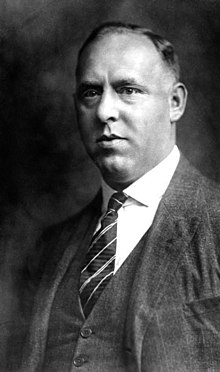Gregor Strasser
| Gregor Strasser | |
|---|---|

Strasser in 1928
|
|
| Gauleiter of Munich & Bayreuth | |
|
In office 26 February 1925 – 1 November 1929 |
|
| Leader | Adolf Hitler |
| Succeeded by |
Adolf Wagner (Munich) Hans Schemm (Bayreuth) |
| Member of the Reichstag | |
|
In office 7 December 1924 – 6 November 1932 |
|
| Constituency | Upper Bavaria |
| Member of the Bavarian Landtag | |
|
In office 4 May 1924 – 7 December 1924 |
|
| Constituency | Pfaffenhofen |
| Personal details | |
| Born |
31 May 1892 Geisenfeld, Bavaria, German Empire |
| Died | 30 June 1934 (aged 42) Berlin, Germany |
| Political party |
Völkischer Block (1922–1925) Nazi Party (1925–1930) Black Front (1930–1934) |
| Profession | Pharmacist |
| Military service | |
| Allegiance |
|
| Service/branch |
|
| Years of service | 1914–1919 |
| Rank | First lieutenant |
| Unit | Freikorps |
| Battles/wars |
World War I German Revolution |
| Awards | Iron Cross |
Gregor Strasser (31 May 1892 – 30 June 1934) was a prominent German Nazi official and politician.
Born in 1892 in Bavaria, Strasser served in World War I in an artillery regiment, rising to the rank of first lieutenant. He joined the Nazi Party (NSDAP) in 1920 and quickly became an influential and important figure. He took part in the abortive putsch in Munich in 1923 and was imprisoned, but released early on for political reasons.
Strasser joined a revived NSDAP in 1925 and once again established himself as a powerful and dominant member, hugely increasing the party's membership and reputation in northern Germany. Personal and political conflicts with Adolf Hitler led to his death in 1934 during the Night of the Long Knives.
Gregor Strasser was born on 31 May 1892 into the family of a Catholic judicial officer who lived in the Upper Bavarian market town of Geisenfeld. He grew up alongside his younger brother Otto, who was considered the more intellectual of the two. He attended the local Gymnasium and after his final examinations, served an apprenticeship as a pharmacist in the Lower Bavarian village of Frontenhausen from 1910 until 1914.
When war broke out in Europe in 1914, Strasser suspended his studies at Ludwig Maximilians University of Munich to enlist as a volunteer in the German Imperial Army. He served in the 1st Bavarian Field Artillery Regiment, rising to the rank of First Lieutenant and winning the Iron Cross of both classes for bravery. In 1918, he resumed his studies at Friedrich-Alexander-University, Erlangen-Nuremberg. He passed his state examination in 1919 and in 1920 started work as a pharmacist in Landshut.
...
Wikipedia
